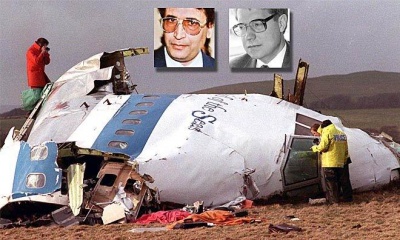Thomas Hayes
Dr Thomas Hayes (born 14 July 1946) joined the Forensic Explosives Laboratory (FEL) in Woolwich in 1974. He was appointed head of FEL in 1985 when it was relocated to the Royal Armaments Research and Development Establishment (RARDE) at Fort Halstead in Kent.[1]
In the latter part of 1989, Dr Hayes retired from FEL to become a chiropodist[2] and was replaced by his deputy Alan Feraday.[3]
In October 2013, Thomas Hayes was called a liar by Steven Raeburn, editor of Scots Law magazine The Firm, in a devastating criticism of Morag Kerr's forthcoming book about the Lockerbie bombing:
- "Dangerous, suspicious Government-fed propaganda, based on the discredited Feraday/Hayes lies. Beware."[4]
Expert witness
Dr Hayes testified that he was the first to discover the piece of crucial evidence (Mebo MST-13 timer fragment) that would convict Abdelbaset al-Megrahi at the Pan Am Flight 103 bombing trial, which took place from May 2000 to January 2001 at Camp Zeist, Netherlands.[5]
Hayes admitted at the trial that he did not think it was necessary to test the tiny timer fragment for explosive residue. Under cross-examination, Hayes agreed that an even smaller sample (from underneath a fingernail) had been tested by two other RARDE scientists (Elliott and Higgs) in the cases of the Maguire Seven and Judith Ward. Both cases were subsequently quashed on appeal, when the RARDE scientists "were found to have lied and suppressed evidence at the trials."[6]
The Scottish Court in the Netherlands also heard that Hayes had examined the timer fragment at RARDE in May 1989, four months after it was said to have been found. But the page recording his findings appeared to have been inserted out of sequence into his notebook at a later date, and the pages renumbered.[7] His RARDE colleague, Alan Feraday, whose evidence followed that of Hayes, was asked to explain this apparent discrepancy but was unable to do so.
Case reviewed
Following a three-year review, the Scottish Criminal Cases Review Commission reported on 28 June 2007 that evidence had been uncovered suggesting that Megrahi may have been wrongly convicted. He was granted leave for a second appeal against conviction.[8]
In a statement dated 29 June 2007 Dr Hans Köchler, international observer at the Lockerbie trial, expressed his surprise at the SCCRC's narrow focus and apparent bias towards the judicial establishment:
- "In giving exoneration to the police, prosecutors and forensic staff, I think they show their lack of independence. No officials to be blamed, simply a Maltese shopkeeper."[9]
Second appeal
New information casting fresh doubts about Megrahi's conviction was examined by three judges at a preliminary hearing in the Appeal Court in Edinburgh on 11 October 2007:
- His lawyers claimed that vital documents, which emanate from the CIA and relate to the MEBO timer that allegedly detonated the Lockerbie bomb, were withheld from the trial defence team.[10]
- Tony Gauci, chief prosecution witness at the trial, was alleged to have been paid $2 million for testifying against Megrahi.[11]
- MEBO's owner, Edwin Bollier, revealed that in 1991 the FBI offered him $4 million to testify that the timer fragment found near the scene of the crash was part of a Mebo MST-13 timer supplied to Libya.[12]
- Former employee of MEBO Ulrich Lumpert swore an affidavit in July 2007 saying that he had given false evidence at the trial concerning the MST-13 timer[13]
The second appeal was to have been heard by five judges in the Court of Criminal Appeal in 2008.[14]
The second appeal actually started at the High Court of Justiciary on 28 April 2009.[15] A documentary film Lockerbie Revisited, which was broadcast on Dutch television on 27 April 2009, focused on the MEBO timer fragment evidence and the role of Alan Feraday and the FBI's Thomas Thurman in its identification.
Megrahi dropped the second appeal a few days before being granted compassionate release from prison on 20 August 2009, and returning to Libya. On 20 May 2012, Megrahi died of prostate cancer.[16]
References
- ↑ "The Forensics Files (part 2)"
- ↑ "Dr Thomas Hayes - From Forensic Expert to Chiropodist"
- ↑ "The Political Scientists of Lockerbie"
- ↑ @MrStevenRaeburn
- ↑ "Police investigations of "politically sensitive" or high profile crimes"
- ↑ "Criticism of RARDE scientists"
- ↑ "Lockerbie trial evidence of Dr Thomas Hayes"
- ↑ "Libyan jailed over Lockerbie wins right to appeal"
- ↑ "Statement by Dr Hans Köchler"
- ↑ "'Secret' Lockerbie report claim" BBC News 2 October 2007
- ↑ Fresh doubts on Lockerbie conviction The Guardian 3 October 2007
- ↑ "Lockerbie trial: an intelligence operation? New revelation about financial offer to key witness from Switzerland"
- ↑ "Fragment of the imagination?" Private Eye issue 1195 (page 28) 12–25 October 2007
- ↑ "Lockerbie bomber in fresh appeal"
- ↑ "Lockerbie bomber Megrahi may be allowed home" Jason Allardyce; Mark Macaskill (2009-05-10)
- ↑ "Lockerbie bomber Abdelbaset al-Megrahi reported dead in Libya"
See also
- Lockerbie Official Narrative
- Cameron's Report on Lockerbie Forensic Evidence
- The Framing of al-Megrahi
- The How, Why and Who of Pan Am Flight 103
External links
- "The Guildford Four: in the name of justice"
- "Dr Thomas Hayes - From Forensic Expert to Chiropodist"
Wikipedia is not affiliated with Wikispooks. Original page source here
